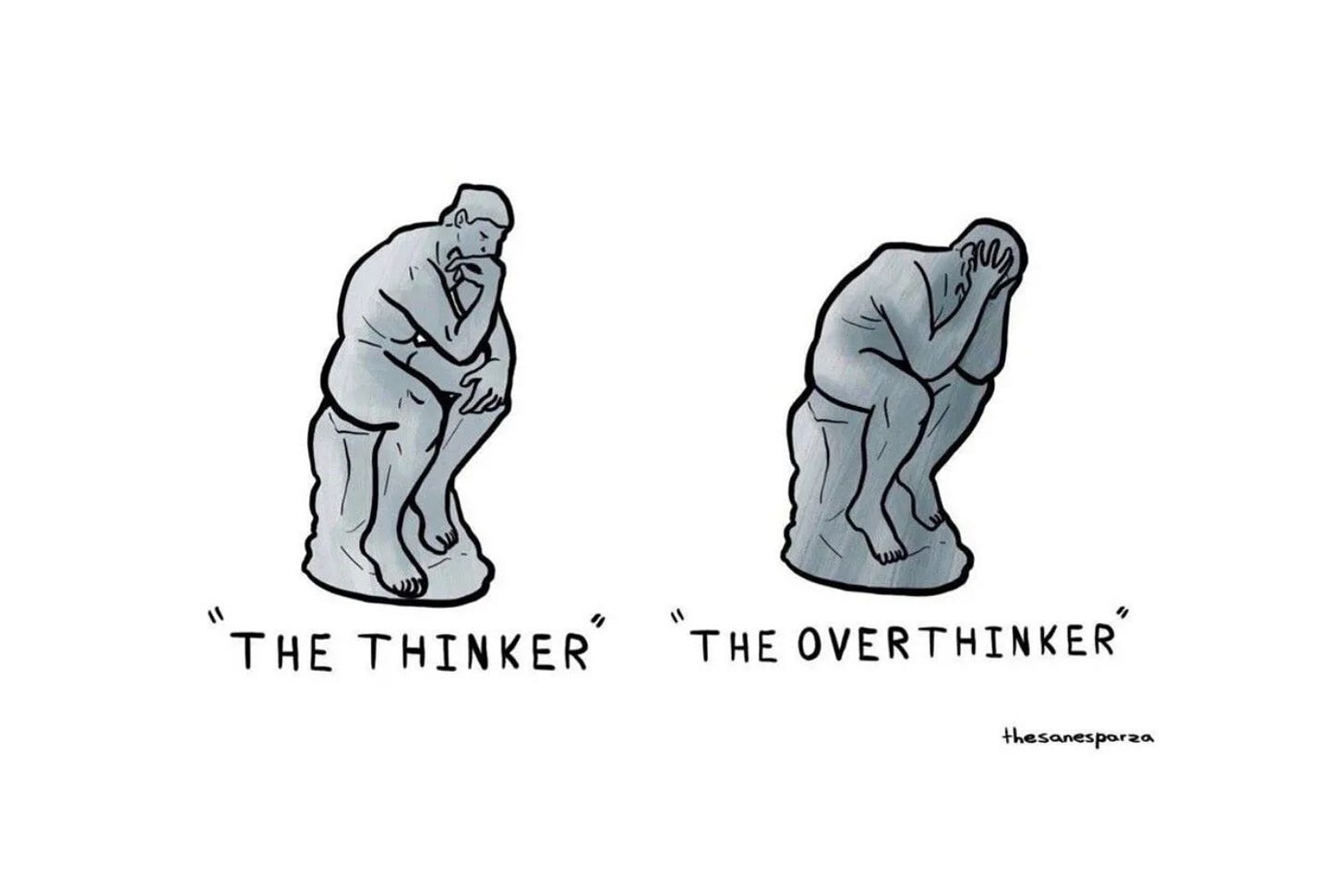10 ideas for overthinkers
“I swear to you that to think too much is a disease, a real, actual disease.” - Dostoevsky
1. Overthinking is a tax on life - The average person spends nearly eight hours per day mind wandering. If you’re awake for sixteen hours per day, that’s half of your conscious existence spent lost in imaginary thought. To appreciate how large this life tax is: it’s the equivalent of January 1st to June 30th each year. If you add sleep into the equation, it gets worse: January 1st to August 30th, unconscious or absent-minded. This leaves you just from September 1st to December 31st for mere scraps of life.
Doestovsky described the overthinking trap as an illness: “I swear to you that to think too much is a disease, a real, actual disease.”
2. Overthinking is amnesia - On a typical day, humans have between 30,000 to 70,000 thoughts. Here’s the tragedy: can you remember a single clear sentence of thought from yesterday? If you’re one of the rare people who can, how about last Tuesday? The same thought loops that feel inescapable in the present moment are then deleted from memory — into the abyss. You don’t consciously notice how much you forget because, by definition, you forget just how much you forget.
3. You can’t run from your mind - An escape route many try for the overthinking trap is travelling. They board the plane, leaving their former life behind, hoping to wake up on the other side of the world free from overthinking. Only to discover the one thing they couldn’t leave at home: Their minds.
4. Overthinking is downstream from low agency - The low agency model of time has three modes: Past, present and future. The high agency model of time has five modes: Past-dwelling, past rectifying, present, future-worrying, and future-building. The low agency model of time assumes all time spent thinking about the past and the future is the same. It’s not. Rectifying the past is 100x better than dwelling on it. Building the future is 100x better than worrying about it. Thousands of hours lost to looping on a past or future worry could be closed with one phone call, one letter, or one email.
5. Never trust a thought - Nietzsche had a rule of thumb: “Never trust a thought you have indoors”. This idea is great, but Friedrich didn’t go far enough. To take it one step further: never trust a thought. Only begin inspecting its truth once it’s gone outside of your mind: Writing, drawing, walking, talking, spreadsheet. Trusting thoughts that happen inside skulls or buildings is a breeding ground for low agency slop.
6. Stop making decisions. Start making experiments - Retire the word decision from your vocabulary. Never use the D-word again. Replace it with experiment. Daniel Kahneman won a Nobel Prize for his work on decision-making and concluded that the biggest lesson was that decision-making theory didn’t make him a better decision-maker. Reality is smarter than your ruminations: Create a hypothesis. Design experiments. Run them. Blitzkreig! Even so-called irreversible decisions like having a child with someone can be turned into an experiment if you think hard enough: Experiment with a dog first.
7. Overthinking is caused by self-importance - Overthinkers believe they have low self-worth, but spend all their time thinking about themselves. Overthinking isn’t low self-worth; it’s narcissism. In rare scenarios where overthinkers think about others, it’s worrying about what that person is thinking about them. Escape the overthinking trap by embracing your inner Galileo: remove yourself as the centre of your universe. Try to think as another person in the room. Imagine all their ruminations and worries. Your self-centred rumination loops will fade away, and you’ll sneak in charisma through the back door.
8. Arrange your mind with Napoleon’s cupboard - Napoleon arranged his mind like a series of cupboards: “Different subjects and different affairs are arranged in my head as in a cupboard. When I wish to interrupt one train of thought, I shut that drawer and open another.” Have a worry cupboard that you visit for 30 minutes per day. Review your worries and action them. At the end of the session, close the cupboard. If a new worry appears, put it in the cupboard, and tell it you’ll see it during your scheduled slot tomorrow. Most worry is caused by your mind being unsure whether you’ll take action on addressing it. When worry knows where it lives in the cupboard with a clear time on the calendar, it quietens.
9. You can’t hide from your mind - A monk tells a novice to go to the top of the mountain with one goal: Have no thoughts. The novice follows the monk’s instructions. He spends all day trying to make his mind go blank — and his mind can’t stop racing.
The novice couldn’t find silence, so he walked down the mountain feeling like a failure.
The next day, the monk tells him to go back to the mountain with a different goal: Keep thinking. The novice could think of anything he liked all day long, but couldn’t allow any gaps to occur between thoughts. The novice followed the monk’s instructions. He spent all morning thinking about everything: dwelling on his childhood to the meaning of life. By lunch time, his thoughts began to dry up, and his mind went silent.
The novice couldn’t escape the silence, so he walked down the mountain feeling like a failure.
If you want to increase overthinking, resist it. If you want to decrease overthinking, welcome it.
10. Overthinking is a solvable problem - When someone suggests a limit on human minds, just reply with this photo of Thich Quang Duc meditating in the lotus position after setting himself on fire in protest against the war. He didn’t flinch once. A nuke so strong you have to delete all past assumptions and say "I don't know".




Love the idea of Napoleon’s Cupboard. I do something similar already in a less literal sense. I try to store different information in different ‘physical’ spaces in my brain.
Loved the monk story and the "never trust a thought" idea :))